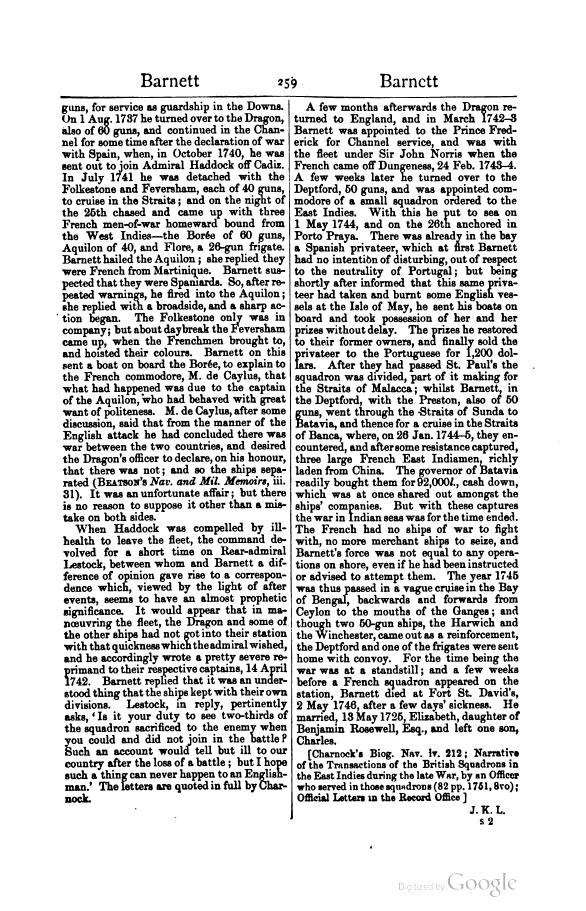guns, for service as guardship in the Downs. On 1 Aug. 1737 he turned over to the Dragon, also of 60 guns, and continued in the Channel for some time after the declaration of war with Spain, when, in October 1740, he was sent out to join Admiral Haddock off Cadiz. In July 1741 he was detached with the Folkestone and Feversham, each of 40 guns, to cruise in the Straits; and on the night of the 25th chased and came up with three French men-of-war homeward bound from the West Indies—the Borée of 60 guns, Aquilon of 40, and Flore, a 26-gun frigate. Barnett hailed the Aquilon; she replied they were French from Martinique. Barnett suspected that they were Spaniards. So, after repeated warnings, he fired into the Aquilon; she replied with a broadside, and a sharp action began. The Folkestone only was in company; but about daybreak the Feversham came up, when the Frenchmen brought to, and hoisted their colours. Barnett on this sent a boat on board the Borée, to explain to the French commodore, M. de Caylus, that what had happened was due to the captain of the Aquilon, who had behaved with great want of politeness. M. de Caylus, after some discussion, said that from the manner of the English attack he had concluded there was war between the two countries, and desired the Dragon's officer to declare, on his honour, that there was not; and so the ships separated (Beatson's Nav. and Mil. Memoirs, iii. 31). It was an unfortunate affair; but there is no reason to suppose it other than a mistake on both sides.
When Haddock was compelled by ill-health to leave the fleet, the command devolved for a short time on Rear-admiral Lestock, between whom and Barnett a difference of opinion gave rise to a correspondence which, viewed by the light of after events, seems to have an almost prophetic significance. It would appear that in manœuvring the fleet, the Dragon and some of the other ships had not got into their station with that quickness which the admiral wished, and he accordingly wrote a pretty severe reprimand to their respective captains, 14 April 1742. Barnett replied that it was an understood thing that the ships kept with their own divisions. Lestock, in reply, pertinently asks, ‘Is it your duty to see two-thirds of the squadron sacrificed to the enemy when you could and did not join in the battle? Such an account would tell but ill to our country after the loss of a battle; but I hope such a thing can never happen to an Englishman.’ The letters are quoted in full by Charnock.
A few months afterwards the Dragon returned to England, and in March 1742–3 Barnett was appointed to the Prince Frederick for Channel service, and was with the fleet under Sir John Norris when the French came off Dungeness, 24 Feb. 1743–4. A few weeks later he turned over to the Deptford, 50 guns, and was appointed commodore of a small squadron ordered to the East Indies. With this he put to sea on 1 May 1744, and on the 26th anchored in Porto Praya. There was already in the bay a Spanish privateer, which at first Barnett had no intention of disturbing, out of respect to the neutrality of Portugal; but being shortly after informed that this same privateer had taken and burnt some English vessels at the Isle of May, he sent his boats on board and took possession of her and her prizes without delay. The prizes he restored to their former owners, and finally sold the privateer to the Portuguese for 1,200 dollars. After they had passed St. Paul's the squadron was divided, part of it making for the Straits of Malacca; whilst Barnett, in the Deptford, with the Preston, also of 50 guns, went through the Straits of Sunda to Batavia, and thence for a cruise in the Straits of Banca, where, on 26 Jan. 1744–5, they encountered, and after some resistance captured, three large French East Indiamen, richly laden from China. The governor of Batavia readily bought them for 92,000l., cash down, which was at once shared out amongst the ships' companies. But with these captures the war in Indian seas was for the time ended. The French had no ships of war to fight with, no more merchant ships to seize, and Barnett's force was not equal to any operations on shore, even if he had been instructed or advised to attempt them. The year 1745 was thus passed in a vague cruise in the Bay of Bengal, backwards and forwards from Ceylon to the mouths of the Ganges; and though two 50-gun ships, the Harwich and the Winchester, came out as a reinforcement, the Deptford and one of the frigates were sent home with convoy. For the time being the war was at a standstill; and a few weeks before a French squadron appeared on the station, Barnett died at Fort St. David's 2 May 1746, after a few days' sickness. He married, 13 May 1725, Elizabeth, daughter of Benjamin Rosewell, Esq., and left one son, Charles.
[Charnock's Biog. Nav. iv. 212; Narrative of the Transactions of the British Squadrons in the East Indies during the late War, by an Officer who served in those squadrons (82 pp. 1751, 8vo); Official Letters in the Record Office.]
